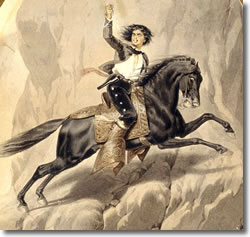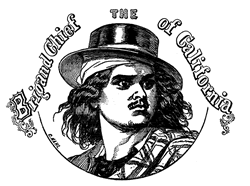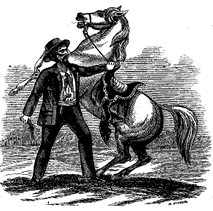"He would ride into town, unchallenged, amid a jangle of spurs …"
by Isabel Allende
From "Daughter of Fortune", 1999
In this selection from her novel Daughter of Fortune, Isabel Allende recounts the efforts of journalist Jacob Freemont to document the story of the legendary California Gold Rush bandit Joaquín Murieta. It is a tale of adventure and cultural upheaval in early California.
Racial Disharmony
During [1850] brief news item was published in the local newspaper about a Chilean or Mexican—no one was sure which—bandit named Joaquín Murieta, who was becoming famous up and down the mother lode. By then, violence was the rule in gold country. Disillusioned when they learned that sudden fortune, a mockery of a miracle, had come to only a few, the Americans accused foreigners of being greedy and of getting rich without contributing to the nation's prosperity. Liquor fired them up, and impunity in doling out punishment gave them an irrational sense of power. An American was never sentenced for crimes against another race; still worse, a white criminal often could choose his own jury. Racial hostility turned into blind hatred. Mexicans refused to accept the loss of their territory in the war, or to be run off their ranches and the mines. The Chinese bore abuse silently; they did not leave, but kept prospecting, not earning enough for a flea, but with such infinite tenacity that gain by grain they amassed wealth. Thousands of Chileans and Peruvians, who had been the first to arrive when gold fever blossomed, decided to return to their countries because it wasn't worth pursuing their dreams under such conditions.
California 1850
 That year, 1850, the legislature of California approved a tax on mining operations designed to protect whites. Blacks and Indians were left out, unless they worked like slaves, and foreigners had to pay twenty dollars and renew rights to their claim monthly, which in practice was impossible. They couldn't leave the placers to travel several weeks to the city to obey the law, but if they didn't, the sheriff took over their mine and gave it to an American. The people in charge of enforcing those measures were chosen by the governor and earned their salaries from taxes and fines, a perfect setup for encouraging corruption. The law applied only to dark-skinned foreigners, even though according to the treaty that ended the war in 1848 the Mexicans had rights to American citizenship. Another decree was the last nail in the coffin: claims on their ranches, where they had lived for generations had to be ratified by a court in San Francisco. This procedure took years and cost a fortune; in addition, the judges and constables were often the same ones who had appropriated the claims. In view of the fact that the law did not protect them, some Mexicans decided to act outside it, spiritedly throwing themselves into the role of outlaws. Men who formerly had been content to steal cattle now attacked solitary miners and travelers. Some gangs were famous for their cruelty; they not only robbed the victims, they took pleasure in torturing them before they killed them. There was talk of one particular bandido to whom they attributed, among other offenses, the terrible death of two young Americans. Their bodies were found tied to a tree, with signs of having been used as a target for knife throwers: their tormentors had also cut out their tongues, pierced their eyes, and cut off live flesh before leaving them to slowly die. This criminal was called Three-Finger Jack, and it was said that he was right-hand man to Joaquín Murieta….
That year, 1850, the legislature of California approved a tax on mining operations designed to protect whites. Blacks and Indians were left out, unless they worked like slaves, and foreigners had to pay twenty dollars and renew rights to their claim monthly, which in practice was impossible. They couldn't leave the placers to travel several weeks to the city to obey the law, but if they didn't, the sheriff took over their mine and gave it to an American. The people in charge of enforcing those measures were chosen by the governor and earned their salaries from taxes and fines, a perfect setup for encouraging corruption. The law applied only to dark-skinned foreigners, even though according to the treaty that ended the war in 1848 the Mexicans had rights to American citizenship. Another decree was the last nail in the coffin: claims on their ranches, where they had lived for generations had to be ratified by a court in San Francisco. This procedure took years and cost a fortune; in addition, the judges and constables were often the same ones who had appropriated the claims. In view of the fact that the law did not protect them, some Mexicans decided to act outside it, spiritedly throwing themselves into the role of outlaws. Men who formerly had been content to steal cattle now attacked solitary miners and travelers. Some gangs were famous for their cruelty; they not only robbed the victims, they took pleasure in torturing them before they killed them. There was talk of one particular bandido to whom they attributed, among other offenses, the terrible death of two young Americans. Their bodies were found tied to a tree, with signs of having been used as a target for knife throwers: their tormentors had also cut out their tongues, pierced their eyes, and cut off live flesh before leaving them to slowly die. This criminal was called Three-Finger Jack, and it was said that he was right-hand man to Joaquín Murieta….
California 1851
In the summer of 1851 Jacob Freemont decided to interview Joaquín Murieta. Outlaws and fires were the chief subjects of conversation in California; they kept citizens terrorized and the press occupied. Crime was rampant and police corruption common knowledge; most of the force was composed of crooks more interested in protecting their partners in crime than the local populace. After one more raging fire, which destroyed a large area of San Francisco, a vigilante committee had been formed by outraged citizens, headed by the ineffable Sam Brannan, the Mormon who had spread the news of the gold. Companies of firemen pulling water carts by hand ran uphill and down, but before they reached a burning building flames would be leaping from the one beside it. The fire had begun when Australian "hounds" had splashed kerosene all through the store of a merchant who had refused to pay them protection money, and then torched it. In view of the indifference of the authorities, the committee had decided to act on its own. The newspapers clamored, "How many crimes have been committed in this city this year? And who has been hanged or jailed for them? No one! How many men have been shot or stabbed, hit over the head and beat up? And who has been convicted for that?

We do not condone lynching, but who can tell what an indignant public will do to protect itself?" Lynchings were precisely the public's solution. Vigilantes immediately threw themselves into the task and hanged the first suspect. The numbers of these self-appointed enforcers grew day by day, and they acted with such excessive enthusiasm that for the first time outlaws took care to move about only in the full light of day. In that climate of violence and revenge, the figure of Joaquín Murieta was on the way to becoming a symbol. Jacob Freemont took it upon himself to fan the flames of Murieta’s celebrity: his sensationalist articles had created a hero for Hispanics and a devil for Americans. Murieta was believed to have a large gang and the talent of a military genius; it was said that he was fighting a war of skirmishes that authorities were powerless to combat. He attacked with cunning and speed, descending upon his victims like a curse and then disappearing without a trace, only to show up a hundred miles away with another attack of unbelievable boldness that could be explained only by magic powers.
The Robin Hood of California?
Freemont suspected that there were several "Murietas," not one, but he was careful not to write that because it would have diminished the legend. On the other hand, he had the inspired idea of labeling Murieta "the Robin Hood of California;' which immediately sparked a wildfire of racial controversy. To the Yanquis, Murieta represented what was most despicable about the greasers; and it was believed that the Mexicans hid him and provided him with weapons and supplies because he stole from the whites to help the people of his race. In the war they had lost the territories of Texas, Arizona, New Mexico. Nevada, Utah, and half of Colorado and California and so for them any attack against the victors was an act of patriotism. The governor warned the newspaper against the rashness of making a hero of a criminal, but the name had already inflamed the public's imagination. Freemont received dozens of letters, including one from a young girl in Washington who was ready to sail halfway around the world in order to marry that “Robin Hood" and people stopped Freemont in the street to ask him details about the famous Joaquín Murieta.  Without ever having seen him, the newspaperman described Murieta as a young man of virile mien, with the features of a noble Spaniard and the courage of a bullfighter. Quite by accident, Freemont had stumbled across a gold mine more productive than many in the mother lode. He decided he must interview this Joaquín, if the fellow really existed, and write his biography, and it were all a fable he would turn it into a novel. His work as author would consist simply of writing in a heroic tone to satisfy the common man's tastes. California needed its myths and legends, Freemont maintained. To Americans, it had come into the union with a clean slate; they thought that the stroke of a pen could erase a long history of Indians, Mexicans, and Californians. For this land of empty spaces and solitary men, a land open to conquest and rape, what better hero than a bandit? Freemont packed his indispensables in a suitcase, stocked himself with a supply of notebooks and pencils, and set off in search of his character. The risks never entered his mind; having the dual arrogance of an Englishman and a journalist, he felt he was protected from any harm. In addition, traveling was by now effected with a certain ease; there were highways, and a regular stagecoach service connected the towns where he planned to make his investigations. It was not the way it had been when he had begun his work as a reporter, riding on mule back, forging a path through the uncertainty of hills and forests with no guide but insane maps that could lead one to wander in circles for all time. Along the way, he could see the changes in the region. Few men had made their fortune with gold but, thanks to adventurers who had come by the thousands, California was becoming civilized. Without gold fever, the conquest of the West would have been delayed by a couple of centuries, the journalist wrote in his notebook.
Without ever having seen him, the newspaperman described Murieta as a young man of virile mien, with the features of a noble Spaniard and the courage of a bullfighter. Quite by accident, Freemont had stumbled across a gold mine more productive than many in the mother lode. He decided he must interview this Joaquín, if the fellow really existed, and write his biography, and it were all a fable he would turn it into a novel. His work as author would consist simply of writing in a heroic tone to satisfy the common man's tastes. California needed its myths and legends, Freemont maintained. To Americans, it had come into the union with a clean slate; they thought that the stroke of a pen could erase a long history of Indians, Mexicans, and Californians. For this land of empty spaces and solitary men, a land open to conquest and rape, what better hero than a bandit? Freemont packed his indispensables in a suitcase, stocked himself with a supply of notebooks and pencils, and set off in search of his character. The risks never entered his mind; having the dual arrogance of an Englishman and a journalist, he felt he was protected from any harm. In addition, traveling was by now effected with a certain ease; there were highways, and a regular stagecoach service connected the towns where he planned to make his investigations. It was not the way it had been when he had begun his work as a reporter, riding on mule back, forging a path through the uncertainty of hills and forests with no guide but insane maps that could lead one to wander in circles for all time. Along the way, he could see the changes in the region. Few men had made their fortune with gold but, thanks to adventurers who had come by the thousands, California was becoming civilized. Without gold fever, the conquest of the West would have been delayed by a couple of centuries, the journalist wrote in his notebook.
"Death to Yanquis"
There was no dearth of subjects, such as the story of the young miner, a boy of eighteen, who after a year's backbreaking effort had gotten together the ten thousand dollars he needed to go home to Oklahoma and buy a farm for his parents. He was walking back to Sacramento through the foothills of the Sierra Nevada one radiant day, with his treasure in a sack over his shoulder, when he was surprised by a band of ruthless Mexicans or Chileans, he wasn't sure which. All he knew for sure was that they spoke Spanish, because they had the impudence to leave a sign in that language, scrawled by knife-point on a piece of wood: "Death to Yanquis." They were not content with beating and robbing him, they tied him naked to a tree and smeared him with honey. Two days later, when he was found by a patrol, he was raving. Mosquitoes had eaten away his skin.
Freemont put his talent for morbid journalism to the test with the tragic death of Josefa, a beautiful Mexican girl who worked in a dance hall. He arrived in the town of Downieville on the Fourth of July and found himself in the midst of a celebration promoted by a candidate for senator and irrigated with a river of alcohol. A drunken miner had forced his way into Josefa's room and she had fought him off, plunging her dagger deep into his heart. By the time Jacob Freemont arrived, the body was lying on a table, covered with an American flag, and a crowd of two thousand fanatics ignited by racial hatred was demanding the gallows for Josefa. Impassive, her white blouse stained with blood, smoking a cigarette as if the yelling had nothing to do with her, the woman was scanning the faces of the men with abysmal scorn, aware of the incendiary mixture of aggression and sexual desire she aroused in them. A doctor tried to take her part, explaining that she had acted in self-defense and that if they executed her they would also kill the baby in her womb, but the mob silenced him by threatening to hang him, too. Three terrified doctors were marched over to examine Josefa and all three declared that she was not pregnant, in view of which the impromptu tribunal condemned her in a matter of minutes. “Shooting these greasers is not the way to go,” said one member of the jury. “We have to give them a fair trial and hang them in the full majesty of the law.” Freemont had never had occasion to witness a lynching before, but this one he described in emotional sentences: how, about four in the afternoon, they had started to lead Josefa to the bridge where the ritual of execution had been prepared but she had haughtily shaken them off and walked to the gallows on her own. The beautiful woman climbed the steps without any help, bound her skirts around her ankles, placed the rope around her neck, arranged her black tresses, and bid them farewell with a courageous “Adios, señores” that left the journalist uncertain and the others ashamed. “Josefa did not die because she was guilty, but because she was Mexican. This is the first time a woman has been lynched in California. What a waste, when there are so few!” Freemont wrote in his article.
The Legend Grows
Following Joaquín Murieta's trail, he passed through established towns, with school, library, church, and cemetery, and others whose only signs of culture were a brothel and a jail. Saloons thrived in all of them, they were the centers of social life. Jacob Freemont would install himself there, asking questions, and so began constructing- with some truths and a mountain of lies, the life—or the legend—of Joaquín Murieta.
The saloonkeepers painted him as a damned spic dressed in leather and black velvet, wearing outsize silver spurs and a dagger at his waist and riding the most spirited sorrel ever seen. They said he would ride into town, unchallenged, amid a jangle of spurs and his gang of cutthroats, slap his silver dollars on the counter and order a round of drinks for everyone in the house. No one dared refuse; even the bravest of men would down their drinks in silence under the villain's flashing gaze. For the constables, on the other hand, there was nothing splendid about him, he was nothing less than a vulgar murderer capable of the worst atrocities, who had managed to escape justice because all the greasers protected him. The Chileans thought he was one of them, born in a place called Quillota; they said he was loyal to his friends and never forgot to repay a favor, which was why it was good policy to help him, but the Mexicans swore he came from the state of Sonora and was an educated, handsome young man from an old and noble family and had turned to crime out of revenge. Gamblers considered him an expert monte player but avoided him because he had crazy luck in cards and a ready dagger that flashed into his hand at the least provocation. White prostitutes were dying with curiosity because it was rumored that this handsome and generous youth had the tireless cock of a stallion, but the Hispanic girls never expected to find out: JoaquínMurieta never used their services but often gave them tips they hadn't earned; they claimed that he was faithful to his sweetheart. They described him as a man of medium height, with black hair and eyes like coals, adored by his men, stalwart in the face of trouble, ferocious with his enemies, and gentle with women.
Jacob Freemont—Journalist or Novelist?
Other people said he had the gross features of a born criminal, with a terrible scar right across his face, and that there was nothing of kindness, breeding, or elegance about him. Jacob Freemont selected the opinions that best suited his image of the bandit, and that was how he portrayed him in his articles, always with enough ambiguity that he could print a retraction in case he should someday meet his protagonist face to face. He looked high and low during the four summer months, without finding Murieta anywhere, but from the many different versions he contrived a fanciful and heroic biography. As he did not want to admit defeat, he invented in his articles brief meetings between cock's crow and midnight in mountain caves and forest clearings. After all, who was going to contradict him? Masked men, he wrote, led him on horseback with his eyes blindfolded; he couldn't identify them, but they spoke Spanish. The same fervent eloquence he had used years before in Chile to describe the Patagonian Indians in Tierra del Fuego, where he had never set foot, now served to pull an imaginary outlaw from his sleeve. He was becoming enamored of the character, and in the end was convinced that he knew him, that the secret meetings in caves were real, and that the fugitive himself had commissioned him to write about his feats because he thought of himself as the avenger of oppressed Spanish peoples and someone had to assume the responsibility of according him and his cause a proper place in the developing history of California. There was some journalism involved, but more than enough fiction for the novel Jacob Freemont was planning to write that winter.
